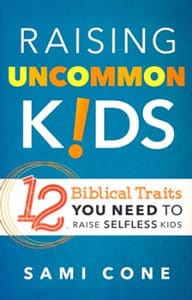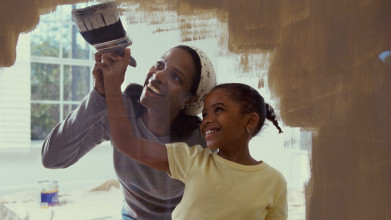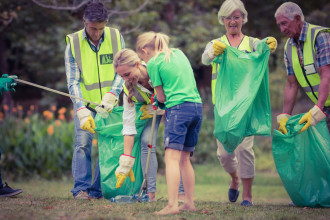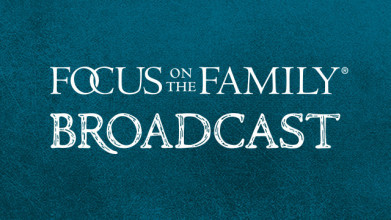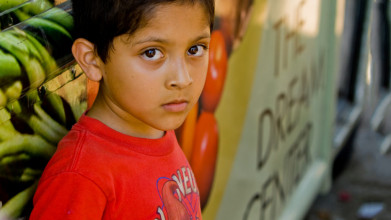Preview:
Sami Cone: Be present to understand what it is that moves your child, and then equip them so they can help others in need.
End of Preview
John Fuller: Well, ways you can help your child become less selfish by seeing the needs of others. That’s Sami Cone, and she’s on today’s Focus on the Family, with your host, Focus president and author, Jim Daly. And I’m John Fuller.
Jim Daly: Hey, John. I think every parents wants, uh, their child to have a selfless, giving heart. But the problem is, they come out of the birth canal pretty selfish. (laughs)
John: (laughs)
Sami: (laughs)
Jim: I mean, that’s the bottom line.
John: That’s, that’s it.
Jim: It is like, “Me, me, me, me, me.” And uh, you know, the truth is, we as parents are kind of like that as well. And the really hard thing is how do we, as sinners, teach our children not to sin? (laughs) And that’s a, that’s a real task and we’re gonna talk about the art of parenting in that regard today with a very good guest.
John: Sami Cone is a money saving blogger, and a college speech professor and a media personality in Nashville and is the mom of two. Uh, she’s out with her first book. It’s called Raising Uncommon Kids: 12 Biblical Traits You Need to Raise Selfless Kids.
Jim: Sami, welcome to Focus.
Sami: I’m so excited to be here, thanks for having me.
Jim: This your first time, right?
Sami: This is my first time out here. Although, I feel like I know you all already because I love to listen.
Jim: (laughs)
Sami: But it’s a treat to be here.
Jim: It’s always fun, but okay, I gotta get right down to business.
Sami: Please.
Jim: We have some desperate parents out here…
Sami: Right.
Jim: … that have nothing but selfish kids. What’s something I could today to help my kid to be selfless?
Sami: (laughs) Turn the mirror on yourself.
Jim: (laughs)
Sami: And-
Jim: Oh man, is that right?
Sami: It’s the answer that, you know, parents don’t wanna hear. And really, I, I hate to disappoint anyone right off the bat, but it, this isn’t a book that’s gonna be a quick fix for your kids. In fact, that’s the problem that we have, and that I see in my own parenting, and with a lot of parents in this generation, is that we want the, ah, quick fix for our kids. Quick, what can I do? Well, the reality is, they’re watching you, parents. They’re (laughs) seeing…
Jim: (laughs)
Sami: … what you’re doing, and you’re right. We are selfish, right?
Jim: Yeah.
Sami: So the best thing you can do is not try to make your kids all of a sudden to be these altruistic kids that give up their birthday parties to help build wells in Africa but start at home. Start modeling the behavior you want to see.
Jim: Well, and in all seriousness, it’s a funny topic.
Sami: Sure.
Jim: But it is the, the thing that is so appropriate to teach your child. But we are selfish as little human beings, aren’t we?
Sami: Sure.
Jim: It’s kind of like its sin nature showing itself.
Sami: Well, absolutely. But that’s the thing, you don’t tell your kids. Let’s, let’s boil it down to real practical because I don’t want anyone walking away from this thinking, they’re not gonna get some practical tips. You don’t tell your kids, “Oh, you don’t feel like making your bed today? Don’t worry about it.” You don’t feel like, you know, saying yes ma’am or yes sir? Ju- that’s okay. Don’t worry about it. You, you don’t wanna, you know, exercise? Eh, nah, it’ll be fine. We have to choose these things, right? And as parents, it’s our job to fill in the gaps with our kids. So when our kids either don’t feel like doing something or maybe just haven’t had the experience to know what to do, it’s our job to put our arms around them and shepherd them into that role. So the first thing that we really need to do is let’s focus on what is the culture of our home? You’ll notice in the book; compassion is the 12th characteristic I talk about. And that’s the problem, is that we want that quick fix of selflessness and compassion, but our kids don’t know how to respect us as parents or be kind to their siblings, or even sometimes what it means to really love God. And until they understand those characteristics, selflessness is, is way far in the distance.
Jim: What about, um, I’m thinking, and I wanna push a bit on this idea.
Sami: Please.
Jim: That modeling is it.
Sami: Mm-hmm.
Jim: It’s a good start.
Sami: Mm-hmm.
Jim: But I know a mom, eh, that I have in mind. She’s got four grown boys now. She is a sweetheart.
Sami: Mm-hmm.
Jim: This mom and dad, both of ’em are just a s- the sweetest couple. She was a schoolteacher…
Sami: Mm-hmm.
Jim: … and I, I would think, at least as an outsider to their family, um, wow. Those are great parents. But the kids gave ’em a run for their money. I mean, these boys were pretty tough on ’em.
Sami: Sure.
Jim: And, um, and so I was w- curious, is it just modeling? Is it that simple? There’s gotta be more to it.
Sami: Let me clarify then because it, you’re right, it’s not just modeling, but what I learned for myself is that a lot of the quote unquote, “selfless” things I was doing, I was doing in private. Think about it. When I tithe to our church, it’s online giving. My kids aren’t even seeing me when they’re in church with me. They don’t see me put money in the plate. When I was volunteering, I was doing that myself. They weren’t alongside me. All of these things that I was doing…
Jim: Hmm.
Sami: … to help others, they weren’t witnessing it. So it’s not just about talking sweetly or talking respectfully, what are you doing to involve your kids? And really, the whole genesis of this book was in this moment where I thought my daughter was being so incredibly selfish, and I realized what makes my heart bleed or what I care about isn’t gonna be the same thing that she cares about. And that’s how we got to (laughs) this point in the first place.
Jim: A- and in that regard, um, what were some of those examples? How did you bring your, your kids in to see the bigger story and be a part of it?
Sami: Sure. So if I can, eh, what I realized is that we had pictures of our compassion kids on the fridge, right?
Jim: Right. Mm, fs- (laughs)
Sami: And I was doing the typical…
Jim: Yeah.
Sami: … you know, “You need to eat your food,” because Gabrielle and Luj don’t have any food to eat. Or, you know, be thankful that you have us because they don’t have their parents at home. I was doing all the typical, you know, they have to walk to school five miles up hill both ways with a sh-
Jim: (laughs) Right.
Sami: You know that whole thing. And it wasn’t budging. And, like I said, I really wanted to have one of those, if the, you know, listeners could see, shake my daughter, you know, by the shoulder moments. And I had to literally leave her room, and I fell to my knees. And I don’t hear God all the time, but I said, “God, you’ve got to give me something,” because th- I, I don’t know what to do with this child. And he put this parable in my head, and I went back in and, and f- fast forward, basically what I said to her was that “You know what? Gabrielle might not have pajamas.” And she sat up in her bed, and you would’ve thought I had just told her she hadn’t eaten for a year. And I was like, “Wait, y- it didn’t-”
Jim: That connected.
Sami: That connected. It didn’t matter that she didn’t have food. Not that it didn’t matter, but to…
Jim: Right.
Sami: … her, she didn’t resonate with the fact that she didn’t have food, didn’t have parents, didn’t get to go to school. But when I told her that she might not have pajamas, she was like, “We’ve gotta do something, Mom. We have to, we have to help now.”
Jim: Mm.
Sami: Like, really? And that’s what started my wheels turning.
Jim: Huh.
Sami: To see what moves the needle for me is not what’s going to move the needle for my kids, and it’s not gonna be the same for both of my kids. So when I talk about modeling, it’s you have to show them that, A, you have to take action. But then it’s our job as parents to find out what makes each of our children tick because then, they are gonna be able to show care and concern not only to you as parents, siblings, neighbors, but then other kids that need them around the world.
Jim: Oh, it makes a lotta sense, although was that more or less a shot in the dark or d- were you going through different things very intentionally? Or was it accidental that you mentioned pajamas and she responded?
Sami: No. To me, because my kids feel like superheroes in their pajamas.
Jim: Okay. (laughs)
Sami: It’s the first thing they do when they come home from school. It’s, you know-
Jim: So they love pajamas?
Sami: They love their pajamas.
Jim: Yeah.
Sami: You know, it, think about it. They get pajamas, you know, at special occasions or cousins hand pajamas down to them. So that was really meaningful to her. So that, I knew enough about my daughter to know that that was something, and, uh, and honestly, I think it was a little divine nudge from God to know that that was something that was gonna make a difference.
Jim: Yeah.
Sami: But whether your, your kids love animals, or whether your kids love basketball, whatever it is, find a way to serve in those areas.
Jim: Yeah. And then your 12 traits. That’s, uh, your heart in the home. You’re kind of describing that.
Sami: Right.
Jim: The second one you mention is your attitude toward others.
Sami: Mm-hmm.
Jim: And you talked about, which I thought is a brilliant thing because so often, uh, we get bogged down in the busyness of life.
Sami: Mm-hmm.
Jim: We don’t have time for others…
Sami: Right.
Jim: … those outside the family. But what you did in your yard really spoke to my heart.
Sami: Mm.
Jim: What was it?
Sami: Well, I think it’s really important, especially in today’s day and age. We don’t always know our neighbors. We’re very quick to…
Jim: Yeah.
Sami: … drive into the garage, close the door, eh, and that’s it.
Jim: Let me just ask you, as you’re listening, do you know three of your neighbors? And that should tell you the test. Continue.
Sami: It is, right?
Jim: (laughs)
Sami: So we just moved a few months ago, and so we decided to just set up some lawn chairs in our front yard. We put out a old table that I could find in the garage. The kid, I said, “Kids, grab some snacks.” So it was potato chips and lollipops. I mean they, (laughs) we’re not…
Jim: (laughs) Yeah. Oh.
Sami: … talking fancy here.
Jim: Yeah, it’s not, uh, fresh, farm fresh stuff.
Sami: No, no.
Jim: (laughs)
Sami: It w- this wasn’t a big, you know, predetermined spread. And we literally went on social media, there’s an app that we use to connect with our neighbors, and we went and knocked on some doors and said, “We’re gonna be outside. We’d love to meet you.” And literally, I mean, the chairs didn’t even match. I f- think I found some music on our phone. But we just made ourselves available. And that was the trick. Sometimes…
Jim: Mm-hmm.
Sami: … we just wait for the perfect moment or the perfect opportunity to move when really…
Jim: Huh.
Sami: … you just have to make yourself available and serve where you are. And that day, it just looked like sitting on some lawn chairs (laughs) on our front yard.
Jim: You know, Sami, one of the things when you look at it, the, the culture, i- it seems to be getting worse and worse.
Sami: Mm-hmm.
Jim: Coarser and coarser.
Sami: Mm-hmm.
Jim: Um, and one of the stories you shared in your book in this regard to your attitude toward others really caught me. It was your daughter, who, who saw a girl coming to school…
Sami: Mm.
Jim: … in the same outfit each and every day.
Sami: Mm-hmm.
Jim: Um, that really gripped me. Tell me about that, and then talk about why we need to be observant.
Sami: Right. Well, eh, sometimes action means just stepping back and observing first.
Jim: Mm.
Sami: Listening, watching. Because we’re so quick to judge, you know? And, and sometimes, our children feel like that’s a, a preborn trait too, right? Is that, that characteristic of judgment, and fairness, and, and righteousness. And so we had started a new school and, eh, I guess she’d been watching this for two weeks and she said, “Mom, this girl’s coming to school in the same outfit every day.” And she was a little embarrassed for her, you know? And she just thought-
Jim: Yeah, that’s tough in a public school.
Sami: It is. And especially, she was in fourth grade at the time.
Jim: Mm-hmm.
Sami: So that was, eh, you know, just when bullying is kind of starting to take place, and she was witnessing some of those kids picking at her. So you could see this internal dialogue of, “I don’t think that’s cool, eh, but I don’t think it’s good to pick on, what do I do?” And I love that she felt comfortable enough to come to me to say…
Jim: Mm-hmm.
Sami: What is this? And I said, you know, I don’t know. But here’s what it could be. Or what do you think it could be? And saying, you know what, w- it turns out she didn’t have enough money to have…
Jim: Mm.
Sami: … new clothes every day, and neither did her siblings.
Jim: Mm-hmm.
Sami: And so what, sometimes we look at, we hold our hands out to God and say, you know, is it this or this? When really, there’s some other possibility that we haven’t fathomed, good or bad. And so with bullying, sometimes we think, well, there’s the victim and there’s the bully. And with this, we were able to have a dialogue and say, “You know what? The bystanders, 70, 90% of us are the bystanders in that situation. Are we gonna make a choice to do something or to just stand back and ignore it?” And so in that instance, like, I can’t say she became her best friend or that, (laughs), you know they run in the same crowd. But she was able to start a dialogue with her where other kids wouldn’t even talk to her. She didn’t ask her, “Why do you do that?” But she just started a dialogue because everyone else was afraid to even approach her.
Jim: Mm.
Sami: And so sometimes, it’s just a matter of teaching your kids just to take a step forward so that someone else feels comfortable then coming…
Jim: Right.
Sami: … towards you.
Jim: And i- in so many ways, that needs to be taught.
Sami: Mm-hmm.
Jim: A- and what I mean i- by that is modeled.
Sami: Right.
Jim: To, back to your original point.
Sami: Right.
Jim: I think kids do see that. You have to have a sensitivity to those people around you and it, it’s an important thing for a parent to teach a child.
Sami: Mm-hmm.
Jim: But they gotta see you model it, don’t they?
Sami: They do. And they have to see you get outside of your norm. That’s, you know, we were talking about being busy, and sometimes we just get so rushed in our routine that we fail to see, what are the other options around us? And if I could diverge a minute, there’s a friend that, uh, you know, they said what does, even, “What does church look like?” You know, s- asking questions about, what does Jesus really want us to do? And he was talking about they went and fed the homeless at this motel one Sunday and e- he brought these, they, you know, they made these brown paper bag lunches, and he went to hand it to, uh, a homeless man and the guy’s like, “No thanks.” (laughs)
Jim: Right.
Sami: He’s thinking, to our friend Tim he said, “Dude, you’re sitting here on a corner. What…”
Jim: Right.
Sami: Take what I give you. And the, the guy said, “Well, what’s in the bag?” And it caught him aback.
Jim: Hmm.
Sami: And he said, “Well, it’s a bologna sandwich on white bread with some mustard and mayonnaise.” And the, the homeless man said, “Well, would you eat that?” And it just…
Jim: Yeah.
Sami: … stopped him in his tracks and he said, “You know what? Uh, eh, you’re right. I wouldn’t.” And the homeless man said, “Well, what do you eat for lunch when you have a sandwich?” He said, “Well, I get a sub. You know, sub roll with some turkey, and lettuce, and tomato and onion.” He goes, “Why do you think I’d be any different?” And it just made us realize, what would Jesus want us to do?
Jim: Huh.
Sami: Does he want us to give our leftovers?
Jim: Wow.
Sami: Does he want us to give the broken toys and the scraps, or does he want us to give something that we would love to receive, and lavish on us?
Jim: Mm.
Sami: But your kids have to first understand what that lavish love is from God and feel it from us as their parents before they can even begin to fathom what that means to share it with others.
Jim: That is really good ’cause I, that was one of the questions I wanted to ask you, what do you with the guy on the s- on the corner with the sign in hand?
John: Mm-hmm.
Sami: Right.
Jim: And, you know, what we tend to do is we’ll, uh, not every time…
Sami: Mm-hmm.
Jim: Uh, but we’ll hand ’em a gift certificate…
Sami: Right.
Jim: … t- to a fast-food place. Um, a- as opposed to handing them money.
Sami: Mm-hmm.
Jim: But i- it always starts a dialogue with our sons, you know? You know, do we do something for them? Are they just doing this as part of their corporate…?
Sami: Right.
Jim: … uh, effort? This is what they do as a vocation?
Sami: Right.
Jim: And it’s hard to, hard to help your kids understand that when it’s every corner.
Sami: It’s every corner, especially where we’re from in Nashville. It’s the same thing. And that’s why I don’t think you can have a prescribed response. If we’re really gonna teach our kids what it means to pray throughout the day as we’re, you know, told in the Bible, and to be led by the spirit, then we have to kind of take each of those situations as they come, whether that just means praying for that person as we see them, whether that means sometimes we do give money. Our kids have said, “What can we give them? What do they need?” We went and researched, what should you put in a, a, quote unquote, “homeless pack.” We, uh, there’s actual research, they need socks because they’re standing all day.
Jim: Right.
Sami: And so sometimes, that just leads into a deeper dialogue. That led us to finding a ministry. You know? Some, sometimes you just have to say, just like if you’re looking for a job, do you keep it to yourself? No, you tell your friends, “Hey, you know, what? I just, I lost my job. I, do you know anyone? Do you know of anything?”
Jim: Mm-hmm.
Sami: You put it on social media. Well, uh, I have a heart for the homeless, and so I shared that with an online small group I’m a part of. A member of ours in New Jersey said, “Oh my gosh, I’ve got friends in Nashville that run a great ministry,” plugged us in and we were able to go… It’s called Open Table Nashville, and we were able to go and help, my kids and I, with this homeless ministry. They welcomed my kids. A lot of times, you don’t see that. And the whole time there, I mean, they weren’t woo-hoo that they were giving up their Friday (laughs) night to go help the homeless, and they kind of had their arms folded, and saying, “Well, how long’s this gonna take?” And “What are we gonna do?” I don’t know.
Jim: Mm-hmm.
Sami: And there was a beauty in me saying, “I don’t know. We’re just gonna show up.”
Jim: Now, let me ask you, we’ve talked about the positive nature of it.
Sami: Mm-hmm.
Jim: Have you seen a time when either you failed, or your husband, or, or the kids failed?
Sami: No, never.
Jim: (laughs)
Sami: (laughs)
John: (laughs)
Jim: Oh, you are that perfect family. I love it.
John: (laughs)
Jim: I’ve been looking for the perfect family.
Sami: No, no. Always. I mean, that, you know, my freedom in Christ, coming to know Christ later in life, was that I didn’t have to be a people pleaser. You know? We’re going to fail. There’s going to be those n- … moments. And I mean, I h- think they happen daily, at least for me and my kids, of didn’t we just go through this yesterday? Like, I always feel like sometimes, we get to that milestone. And we did that when I was a k- you know, our kids were babies. I remember calling my husband, being like, “I found the perfect bottle that won’t make them vomit r- everywhere.”
Jim: (laughs)
Sami: I found, he’s like, “Okay, dear.”
Jim: (laughs)
Sami: And then the next day, it would happen again. You know? And that, I feel like we feel that there’s a, a destination.
Jim: Huh.
Sami: And one of my mentors said it, it’s a journey. And that encouraged me and discouraged me at the same time to know that some of those battles that we fight, that we think we’ve overcome, are, are, you know, settled. But we come upon them the next day. But that’s when I realize that I have to take a step back as a parent and realize my kids aren’t purposefully trying to drive me nuts most of time. (laughs) They’re not on a mission…
Jim: Yeah.
Sami: … to really push me. And as parents, we take everything so personally that our kids do, and that’s where a lot of these battles come in. And w- I’ve found that I have to step back. And I do this with my husband now. Sometimes, if we’re in a b- a, you know, heated discussion…
Jim: Discussion, as we call it.
Sami: (laughs)
John: What do you mean?
Jim: (laughs)
Sami: What do you, yeah, sorry. Uh, that’s right.
John: (laughs)
Sami: John, eh, John’s got it figured out.
Jim: (laughs)
Sami: We literally will stop and say, “We’re on the same team.” You’re not my enemy. We are on the same team. You’re not my enemy. And I’ve found things, simple things like instead of poking or pointing a finger, we’ve learned in our family to put a, a flat hand on an arm just to say we’re, we’re not against you. We’re with you.
Jim: Huh.
Sami: And just little things that sometimes we have to give ourselves a time out and think, you know what? We’ll come back to this tomorrow.
Jim: Yeah.
Sami: It doesn’t have to be solved today. We have to be respectful, obedient and honest, but we don’t have to figure everything out today.
Jim: Hmm.
John: You’re listening to Sami Cone today on Focus on the Family with Jim Daly, and we’re talking about Sami’s book, Raising Uncommon Kids: 12 Biblical Traits You Need to Raise Selfless Kids. We’ve got that available at focusonthefamily.com/broadcast or give us a call. Let’s go ahead and continue now our conversation with Sami Cone.
Jim: Hey, uh, we covered your heart at home, your attitude toward others, and, uh, I wanna move now to the, w- uh, third one, which is your influence in the world. And in fact, eh, eh, this was kind of local for you there in Nashville…
Sami: Mm-hmm.
Jim: … because you had that huge flood.
Sami: Right.
Jim: Uh, in fact, I was down there not long after…
Sami: Hmm.
Jim: … going to the Opryland Hotel.
Sami: Oh, right.
Jim: And they were in trouble. I mean, I think they were four or five feet underwater.
Sami: Eh, yeah.
Jim: So I remember that very well.
Sami: Mm-hmm.
Jim: Wh- How did your family react to that there in Nashville?
Sami: Well, y- eh, several ways. The, the most interesting is that, in our first year of moving to Nashville, we had to move three times. And so we were having a little pity party, honestly. And that was the year before the flood. And we were like, “Why is it so hard? Wasn’t, weren’t we supposed to move to Nashville?” Well, it turns out that we ended up in an apartment called Hillmead, literally on a hill. The two previous houses or apartments we had lived in were flooded.
John: Hmm.
Sami: And so that was a great lesson even for our kids that it, three and five at the time, to say, “Look, God knows what we don’t always know.” But then, with these preschoolers, I thought, “Well, how can I help?” You know, after we were able to get out and on the roads after a few days. What can I do with these little kids in tow? And so talking about modeling, I just drove to our church because I’m a, I’m a frugal girl so I had quite the stockpile of cleaning supplies, and toilet paper and things that people needed ’cause they’d lost everything. And I drove to the church, and I dropped it off. And I could have stopped there, but I said, “Well, do you, do you need anything else?” With me in my minivan and my…
Jim: (laughs)
Sami: … (laughs) my two kids?
Jim: My two kids?
Sami: And they said, “Actually, yes. We need these supplies to be taken to the” kind of ground zero, as we called it, “and we need you to shuttle back and forth between,” what was a auxiliary campus and our main campus. So for the next couple days, I did that. And again, we weren’t tearing down drywall or doing anything major, but it was a need that needed to be met. And so often, especially for kids, I feel like, well, I don’t have time. I don’t have, you know, money. I don’t have my own stuff…
Jim: Yeah.
Sami: … to donate. But if you take the time to just say, “Well, let’s give what you have and let’s do it now,” what does that mean?
Jim: You know, I’m thinking, Sami, with, uh, young kids like that…
Sami: Mm-hmm.
Jim: … you started early, you modeled it early.
Sami: Right.
Jim: And so as they become 11, 12, 13, they have a little more, uh, understanding of it.
Sami: Sure.
Jim: What about, um, the parents that have now the 13, 14, 15-year-old? And maybe, you know, they haven’t done a great job in this area. They’ve been busy, life is busy.
Sami: Mm-hmm.
Jim: We’ve run along. Everybody’s got their phone or whatever.
Sami: Mm-hmm.
Jim: We come into our garage, we go in, we quickly make dinner, we clean the house up really quick together.
Sami: Right.
Jim: And we’re generally a good Christian family.
Sami: Sure.
Jim: But we just haven’t done this. And now, the 15-year old’s going, “Ow, man, I don’t wanna go volunteer down there at the soup kitchen. Come on, Mom.”
Sami: Right. (laughs) Gimme a break.
Jim: I mean, come on. Um, uh, how do you, with slightly older children, begin to reorient them to these good things to become less selfish?
Sami: Right, two things that I will say that I hope everyone pays attention to. Number one, start at home. What does your family want to be known for? You can do that tonight around the dinner table. If you’re f- If you’ve got a military family, get on Skype. Whatever it is. Ask, what do you want our family to be known for? Have everyone s- throw out three characteristics and create a family mission statement from that. Because how can you, again, give what you don’t have? So start there and say whatev- I mean, I don’t care if you’re trying to potty train a child or if you’re getting ready to send them off to college. Y- you have to focus on one thing at a time. Right? Don’t try to put all 12 characteristics into effect in one day. So what do we want our family to be known for? What do we want to focus on today? That’s step number one. Number two is find out what moves your kids. A little bit what we were talking about before. If you see them on social media all day, instead of stealing the phone away from them, say, “You know what? We’re gonna do an experiment.” Right? This isn’t a puni- it’s an experiment. (laughs) And for the next week, I want you to only post on Instagram, or Snapchat or whatever the kids are using these days, about a charity that you can help. Because organizations are just fraught with ways… If you use this hashtag, we’ll donate a dollar to a child in need. Or pick a…
Jim: Huh.
Sami: … you know, a Compassion or a Operation Christmas Child and post pictures of kids. So use where they are to help them. You know what? If they love, like I said, if they love a sport, you know what? Let’s organize a, a pickup game in the community and just say, “We’re gonna be here at this time.” And let’s offer to go pick up the kids from the YMCA, or whatever it is. Be present to understand what it is that moves your child, and then equip them so they can help others in need.
Jim: That’s a great piece of advice. Eh, let me ask you about, uh, the mission trip.
Sami: Mm-hmm.
Jim: We just got back from the first Daly family big mission trip in Africa, and it was terrific. We went with an orphanage group there and, uh, they run schools, and it was really great for the kids to see a different part of the world.
Sami: Mm-hmm.
Jim: Course, this is Africa. I think the impact will be lifelong for them. But talk about the need to introduce your kids, and what would be the right age to go on a family mission trip.
Sami: Right. Well, I think that’s great that you went to Africa, but let me also say there’s a need next door.
Jim: (laughs) Yeah, that’s true.
Sami: Right? There’s a, there’s a need everywhere, sometimes where you don’t expect there to be a need. Uh, you know, I found there’s a little community garden where we just moved into. I thought, “Oh, I, I wanna try gardening. This is great.” Well, it turns out it’s for refugees, for these families that have been displaced. So I mean y- we almost have a mission field literally, figuratively, eight houses down from us. And so we took a, a m- what we called a mainland mission trip to a small town in Kentucky and I, I’ll admit, I did not (laughs) have the best attitude. I was content sending sc- backpacks and back to school.
Jim: Oh, that makes me feel better. (laughs)
Sami: Yeah, it, I’m not, I mean, I’m speak, I wrote this because I need this. This isn’t I’ve got it all figured out, I mean, I think if you read the book, you’ll see it’s, it’s fraught with my (laughs) failures. But y- we realized that we could actually, instead of just giving the, the backpacks or the gifts, which is what we had been doing, we could actually go hand deliver them to the kids ourselves. And I think you’ll find, there’s more opportunities, even if it’s not within your church. Look in your community to see, where can we actually do something like this? And so we drove the eight hours to, you know, the state just north of us to be able to do that. And we slept on a gym with no air conditioning, and on the floor of that gym, and we ate some strange lunch meat for a while. But you know what? We were there. And it’s funny, we talk about kids needing to know everything. My daughter was appalled because I was assigned the face painting duty. And she…
Jim: (laughs) She knows you don’t have that talent?
Sami: I have no artistic ability whatever.
Jim: (laughs)
Sami: And she’s an artist, right?
John: Oh.
Jim: Ah. (laughs)
Sami: That’s the one thing she’s really good at, and she was almost angry. She was like, “Mom, you have got to tell them you cannot do this.”
Jim: (laughs)
Sami: Like, she thought I was really, like, pulling one over their head. I said, “They don’t care.”
Jim: Yeah.
Sami: I just have to show up. So I, uh, you know, and my line was pretty long, I, I like to say, for the face painting.
John: (laughs)
Jim: And how many, how many basketball face paints did you do? (laughs)
Sami: Oh my gosh. They were like, “I want the Kentucky Wildcat.” I was like…
Jim: (laughs)
Sami: We’re gonna have to be a little bit imaginative about that.
Jim: Eh, how ’bout an apple?
Sami: Right.
Jim: (laughs)
John: (laughs)
Sami: Exact- A heart. I can do a heart. But I just said, “Sure.” But I, that was, that’s why she was mad, ’cause I kept saying sure to everyone and I just…
Jim: (laughs)
Sami: They don’t know. They can’t see it.
Jim: (laughs)
Sami: It’s on their face. Right?
Jim: (laughs) It’s bad.
Sami: And she stood back, and I said, “Caris, just, just be.”
Jim: Yeah.
Sami: Just look.
Jim: Wow.
Sami: We talk about observing. And she ended up playing with just a girl, one girl. And they might think, well, maybe she wasn’t doing as much ’cause it was just one child, but it meant a lot to that one child. And so…
Jim: Yeah.
Sami: … you’re right. When we do a mission’s trip, it’s really not as much for the people that we’re helping as it is for us to see w- how that we can put our own needs aside.
Jim: Well, and that’s the big benefit. Your children learn, I think, that when you give, you feel better.
Sami: Yes.
Jim: There’s something that you gain, which I think is much more than what you give.
Sami: Right.
Jim: And, uh, it helps you spiritually in a big way. L- let me ask you this. Um, I, uh, this is a funny story. So in your book, you talk about creating the yes day.
Sami: Yes. (laughs)
Jim: And I love that. So literally, last night I’m looking, reading through the book…
Sami: Uh-huh.
Jim: … and the material. And I say to my boys at the dinner table, “Would you guys like to have a yes day?”
Sami: (laughs)
Jim: They go, “A yes day?” No!
Sami: Really?
Jim: We don’t want a yes day. That’s unfair. And they just went off. And I, I said…
Sami: That’s funny.
Jim: … “I think you guys are missing the point. This is the yes day where w- Mom and I need to say yes.” And they went, “Oh yeah, absolutely.”
Sami: Oh yeah. (laughs)
Jim: “We want that yes day.”
John: (laughs)
Jim: They thought I meant they would have to do whatever… (laughs)
Sami: They would have to say yes.
Jim: … I told ’em to do.
Sami: Mm-hmm.
Jim: So that was kind of, probably a selfish indicator, isn’t it?
Sami: It, yeah…
Jim: (laughs)
Sami: … a little bit. Well, and you know, the, again, it’s just b- what are you doing to shake up the routine? Again, this isn’t something that’s gonna last forever. But as parents, right? We’re supposed to be turning this mirror on ourselves. So the yes day, again, is really more for us. The kids think it’s fun, but is that gonna scar them for life or is it gonna change them? No. But for you as a parent, I think what it did for me is that it helped me realize how many times I was saying no. And when you hear that over and over again as a child, it makes you resentful and it just makes you harbor bitterness, honestly.
Jim: Mm.
Sami: And so if you can take a day o- And again, don’t make it a major school day or anything, you know, a day on a weekend. And we had a few parameters, you know. They couldn’t ask for a million dollars or, you know, it was kind of like the genie wishes, right? You… (laughs)
Jim: Oh yeah.
Sami: You can’t hurt anyone, and you can’t do anything crazy. But it just taught me to say, “Wow, these things that I would normally say no or not now to, like playing outside or making, you know, waffles for dinner, just you, you’d be surprised at the simple requests that your kids have that we just learn to say no to. And so again, training yourself as parent to be open to what’s not typically in front of you.
Jim: Well, your book is full of great ideas. Raising Uncommon Kids: 12 Biblical Traits You Need to Raise Selfless Kids. Uh, Sami, this is terrific. Um, let me just wrap this with a scripture ’cause, uh…
Sami: Mm-hmm.
Jim: … it hits me, in Philippians there, in, I think, the second chapter, “Do nothing out of selfish ambition or vain conceit. Rather, in humility, value others above yourselves.”
Sami: Mm-hmm.
Jim: And that’s what you’re talking about.
Sami: Amen.
Jim: How to train your children to do exactly what that scripture’s saying. Sami Cone, thanks for being with us.
Sami: Thank you so much for having me, it’s been such a joy.
John: What a helpful conversation and, uh, that scripture in Philippians is so key to raising our children to think outside of themselves. It’s a good reminder for us as well, isn’t it? And let me just remind you that Focus on the Family is here for you. We wanna help you be the best parent you can be and find the resources you need to raise your children lovingly and with truth. One of the ways that we can serve you is through our Live It Challenge, which provides monthly activities to help your kids build their faith and strengthen their relationship with Christ. Also, we have Sami’s book, Raising Uncommon Kids, which is a fantastic resource to help you teach your children positive behaviors and attitudes based on scriptures. Uh, donate today. Make a monthly gift or a onetime gift of any amount, and we’ll say thank you for joining the support team and enabling Focus on the Family to continue in our work by sending a copy of Sami’s book, Raising Uncommon Kids. Donate, get the book, and check out our Live It Challenge. All the details are at focusonthefamily.com/broadcast or call 800, the letter A, and the word FAMILY. On behalf of Jim Daly and the entire team, thanks for listening today to Focus on the Family. I’m John Fuller inviting you back as we once again help you and your family thrive in Christ.











